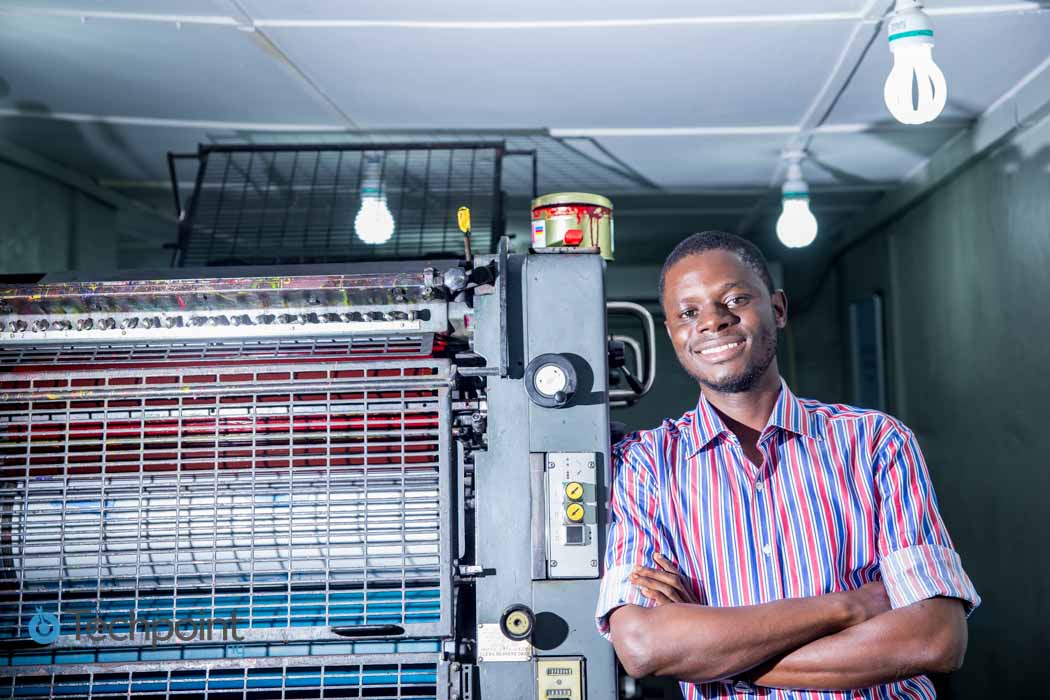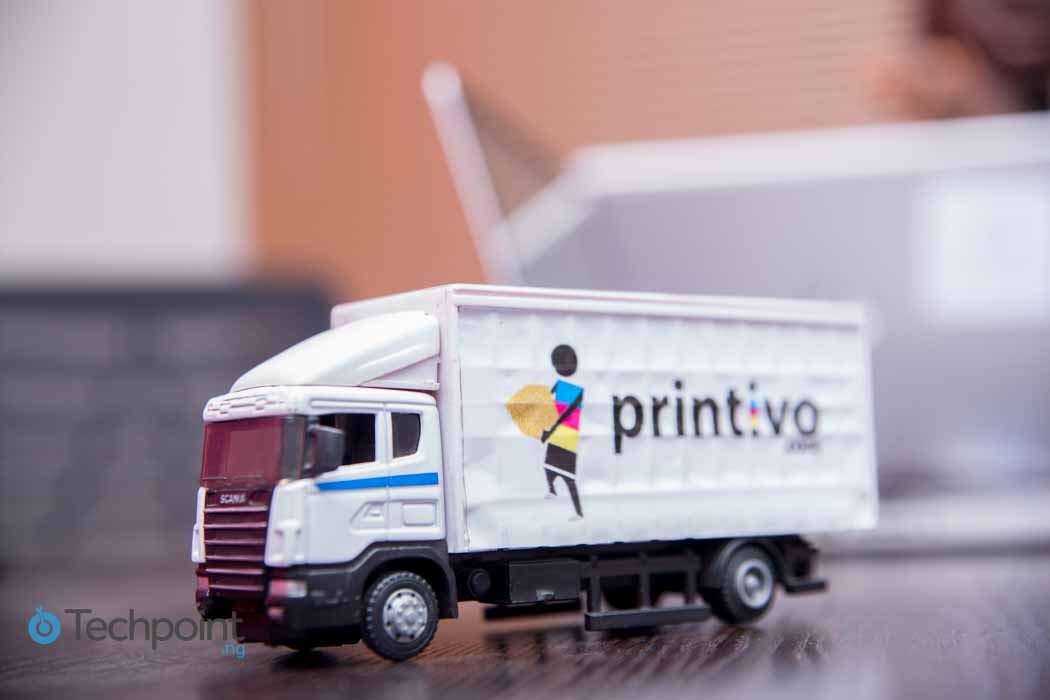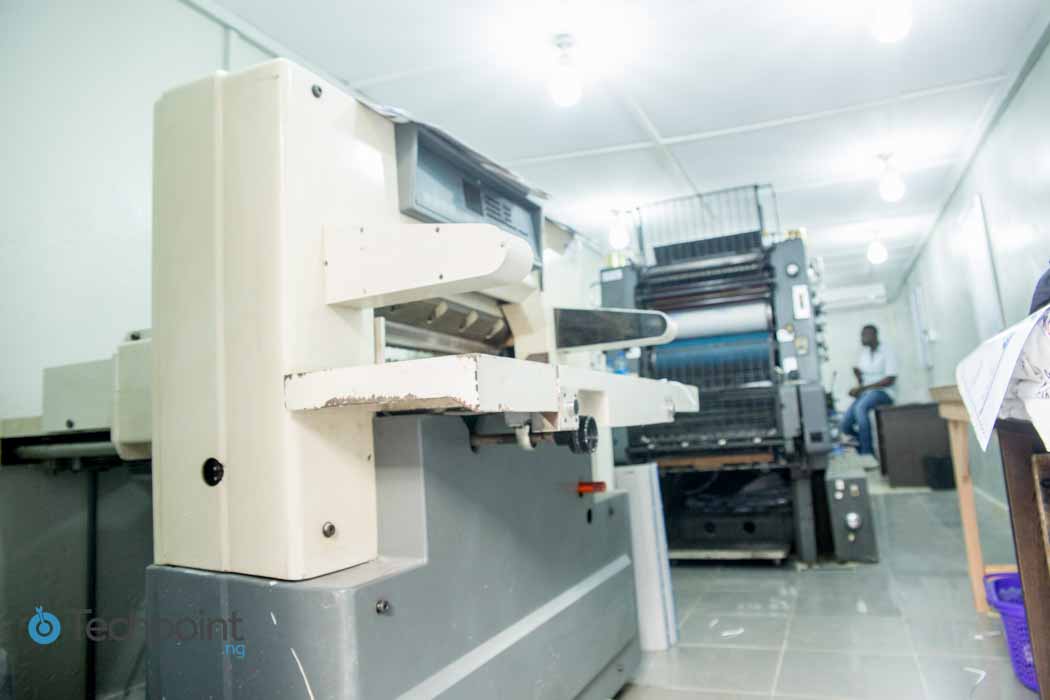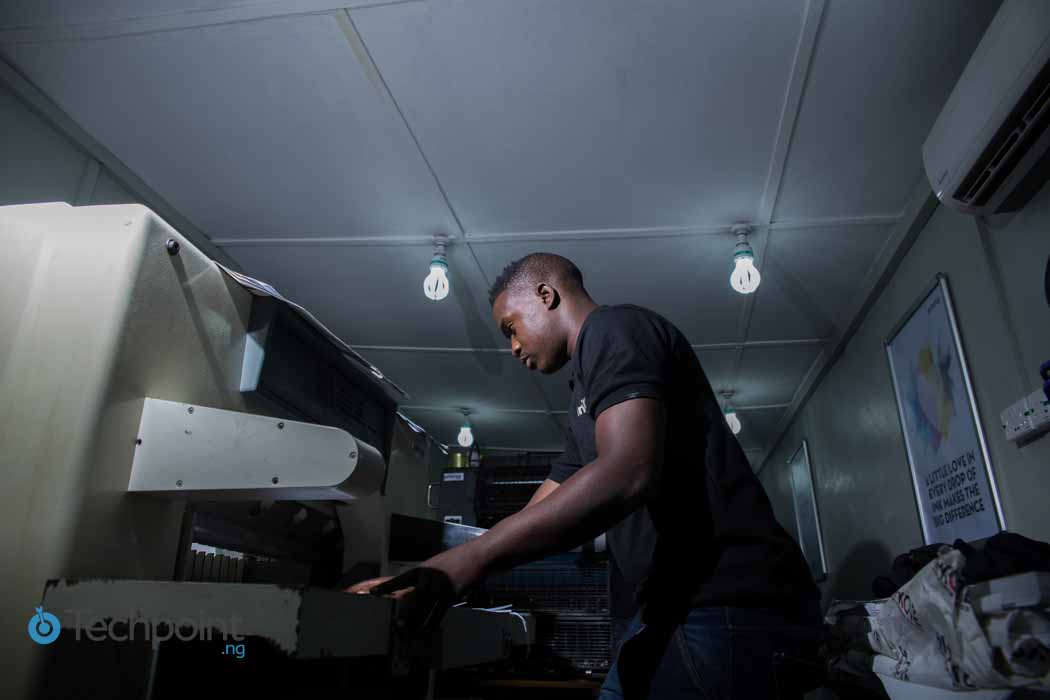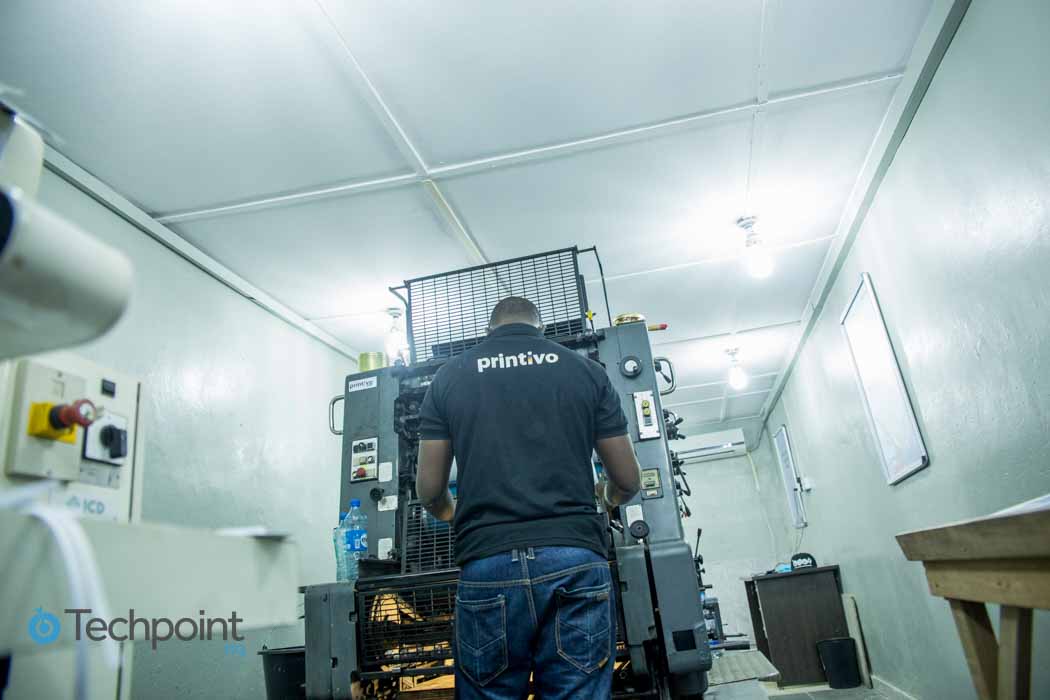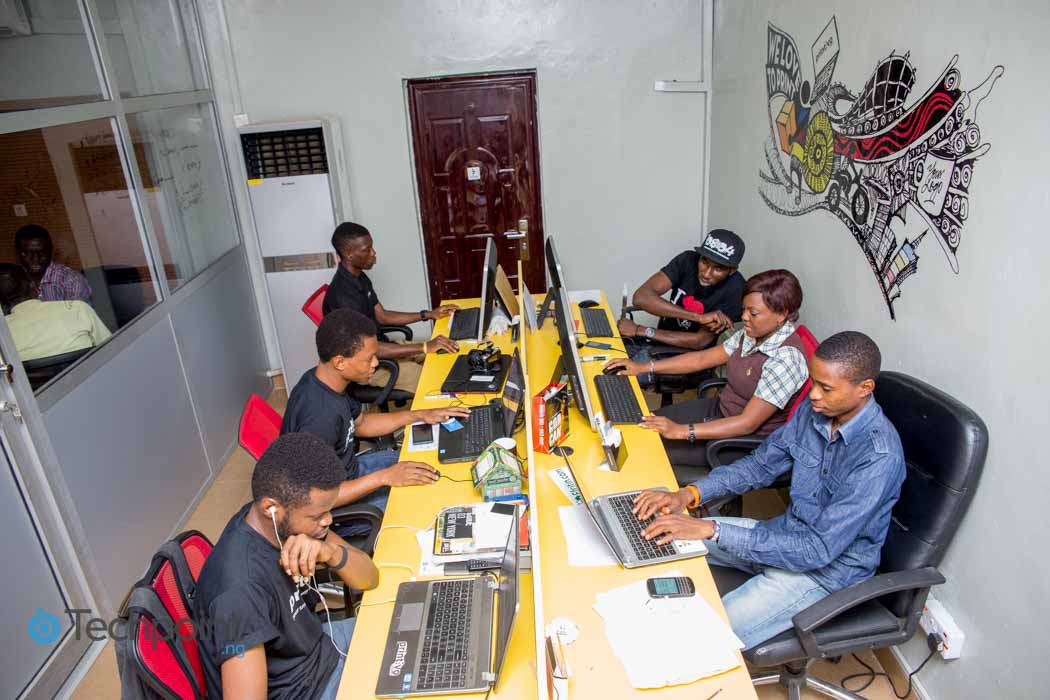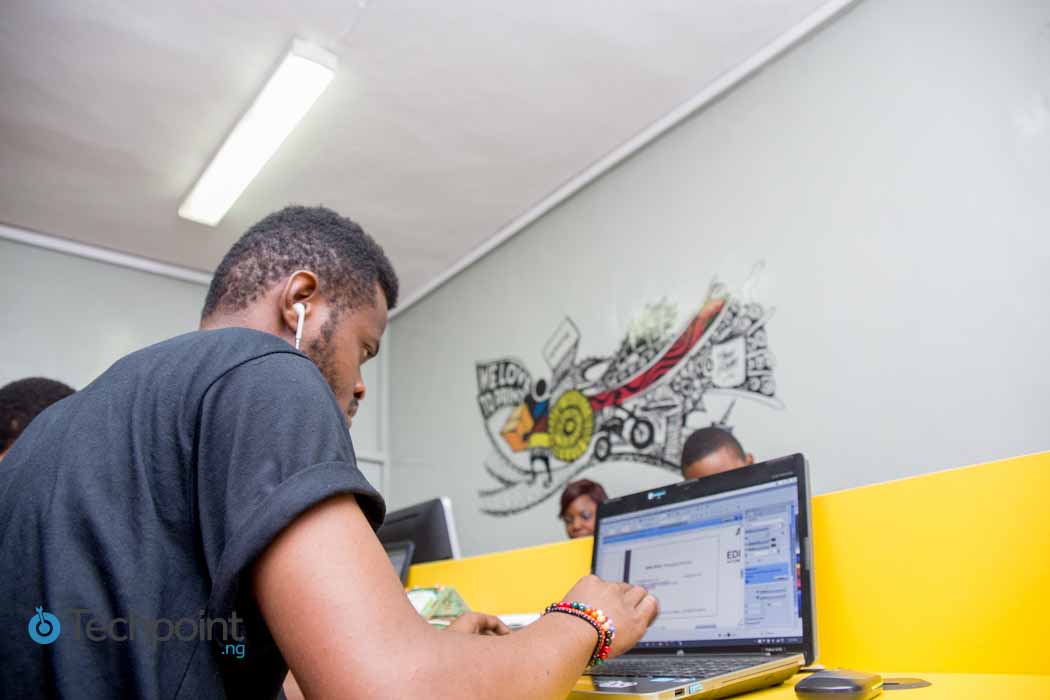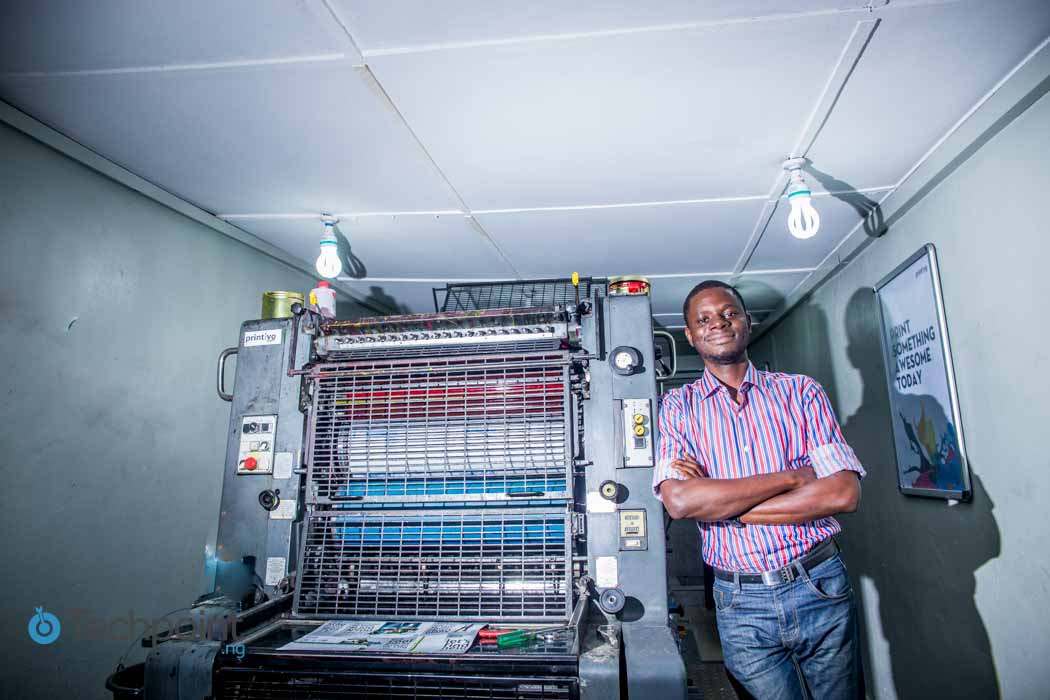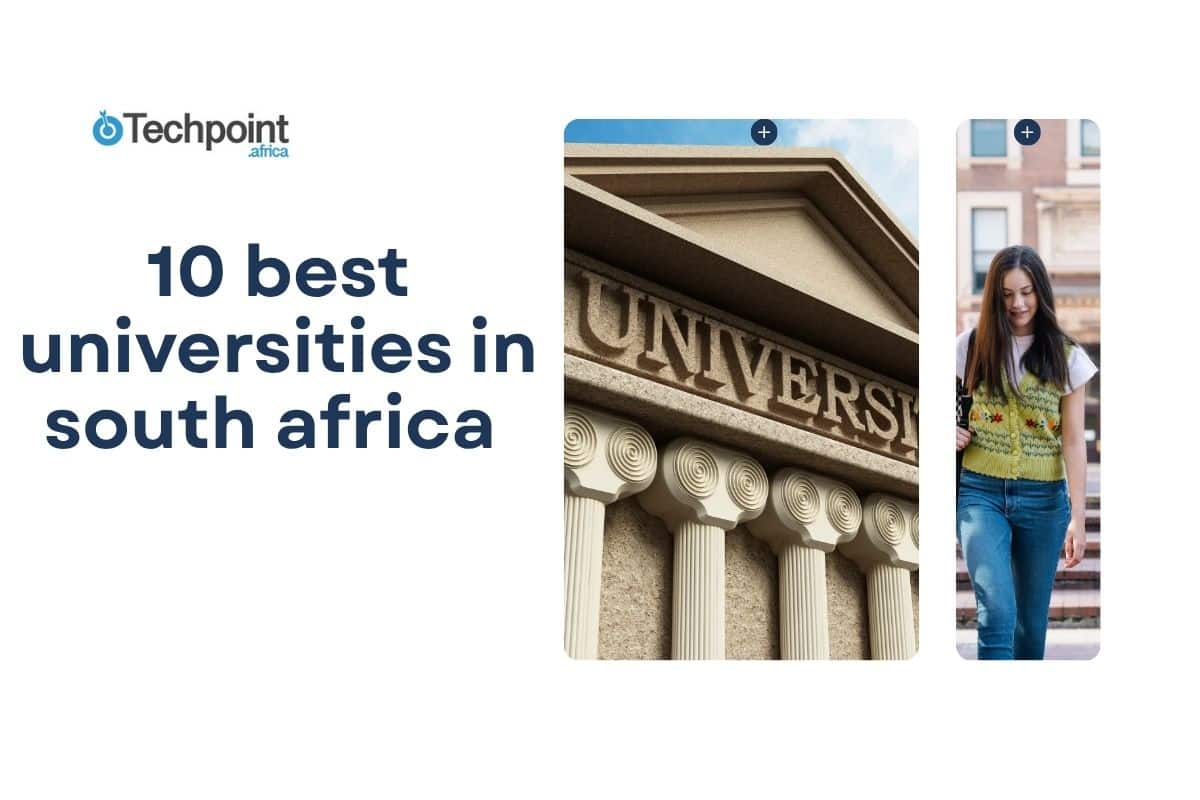If you were on a budget but urgently needed to print a few 100 business cards, the traditional way would be to call on your “trusted” Shomolu printer to do the job. This is not without the risk of possible disappointment and, no doubt, extra charges for printing so unprofitable a quantity of business cards at such short notice. The experience is even worse if you don’t live around Shomolu.
This is exactly were Printivo comes in. Symbolic of its value proposition, the startup is situated on the outskirts of Shomolu — the undisputed printing hub of Lagos — and only about 5 to 10 minutes drive from Yaba — the widely acclaimed tech hub of Lagos. By marrying web technology with print production, they are able to provide print-on-demand services, particularly to SMEs that cannot afford to print in bulk, at very affordable prices. Customers can place small orders on the Printivo website, from the comfort of their homes, and have them delivered in a matter of hours or days.
Techpoint spent an evening with Printivo Co-Founder and CEO, Oluyomi Ojo where he shared with us the inspiration for Printivo, the challenges and the vision and his personal views of the local ecosystem.
Please tell us a little about your educational and professional background
I will call myself a design entrepreneur because everything I have ever done in my life that earned me money has been something around Graphic Design and Print Production. I studied Applied Mathematics at Ladoke Akintola University of Technology, Ogbomosho. People often wonder how I transited from Applied Mathematics to Advertising and then Print Production.
While in college, I started printing and design. Back then, I would call myself a Print Broker – we create the designs and outsource to print firms. This had me shuttling between Lagos and Ogbomosho almost every week. It was just a student hustle for me. Immediately I left college, I started a Design and Advertising firm called Urbanbaze. It was my sole business. We did quite a number of projects working with brands like Etisalat, Honda and First Bank.
But I saw a niche – a market that wasn’t being catered for. That was the SMEs and that’s basically why I decided that we – my Co-Founders Ayodeji Adeogun, Ibukun Oloyede and I – should setup Printivo. It was supposed to be a side project, a print production arm of the business, for us at the agency. But right when we were about to start, it dawned on us how huge it was. So we decided to handle it as a separate business on its own.
So you probably never worked for anyone?
I took an unpaid internship when I was in 400 level. I worked in an ad agency as a graphic artist. I was supposed to run for 6 months but thanks to an ASUU strike at the time, it extended for 1 year. It was in that time I really understood what it was like to build a design business.
How much has Printivo grown since it launched a little over a year ago?
It’s been a very great journey between when we launched and now. We launched with basically 4 products – business cards, letterheads, envelopes and fliers. We’ve added greeting cards, bags, gift items, custom mugs, magic mugs, roll-up banners, posters. We are expanding the product category by the day. We are also going into merchandise products in the nearest future. We started with 4 employees and have grown to 13 employees now. We are still growing.
Without going into much details I’d say we are doing between 10 and 15x of what we were doing when we launched.
You already had Urbanbaze before Printivo. How easy was it starting up Printivo?
I always say, if you really want to succeed in something, burn the ships. When we launched Printivo, all the funding we put into Printivo was spent on setting up the business. As at the day we launched we had almost nothing left in our account. Everything had gone into acquiring machines, developing the website and setting up the business.
So it was a case of myself and the co Founder’s, Ibukun and Deji, and the few guys we started it telling ourselves we either make money from customers or this business dies. The story has been amazing since then. Yes, the first one month was tough. It was really crazy, the founders had to sacrifice salaries.
Considering that funding was a challenge, have you raised any funding rounds since them
One of the things I tell people is, when you are building a business, there are various possibilities to funding. We had an advisory board which was made up of quite successful people in the industry and people in finance. One of the things someone on the board said to us was, “guys, when you see free money, grab it”. It didn’t sink at the moment. He was aware that as entrepreneurs we feel weird about free money.
One such channel for free money was YouWin. We have quite a large number of tech people who saw YouWin and didn’t go into it. The Federal Governement kept funding businesses that can’t even scale. Meanwhile there were some really good tech business that weren’t able to scale for lack of funding. The YouWin opportunity was there, we grabbed it. We got N7 million from there and as it came in, we told ourselves this money isn’t going into anything else besides expanding our capacity for production.
We also won an Etisalat innovation award. The $10,000 we got from that also went straight into the business.
So at the point that we discovered that we were making enough revenue to keep the business going, to pay salaries and keep operations going, every other source of money went straight into expanding our capacity.
One perception in the local tech ecosystem is that there isn’t enough funding. Some would argure that there aren’t enough good startups. What’s your take on that?
I think one of the major problems is education. When I say education, I’m not talking about going to school. I’m talking about knowing what to do to get what you want. The funding landscape in Nigeria may not really be as interesting as it is in a place like The Valley. However, there are people in Nigeria who are looking for business they can fund. Unfortunately most founders don’t even know how to raise money.
I know quite a number of founders that are building really awesome startups. However, investors are not Santa Claus. Most of them are investing other people’s money. What this means is that as you are looking for profit, an invesor is also looking for profit. So you need to show your business to that guy that if he invests, there is something in it for him.
I think that is where a lot of things are missing. It’s like he that has before is he that is still having. And he that does not have still has not; those that have raised keep raising.
It is just because of a lack of information or technical know-how of Startup funding works. I didn’t come from tech into tech. I came from advertising. I’ve had six years of my life in advertising before coming into tech. So I didn’t come into tech as a startup founder. I came in as a business man. Funding wasn’t really the first thing on my mind but rather getting the business off the ground. Getting into sustainability, if not profitably, as fast as possible.
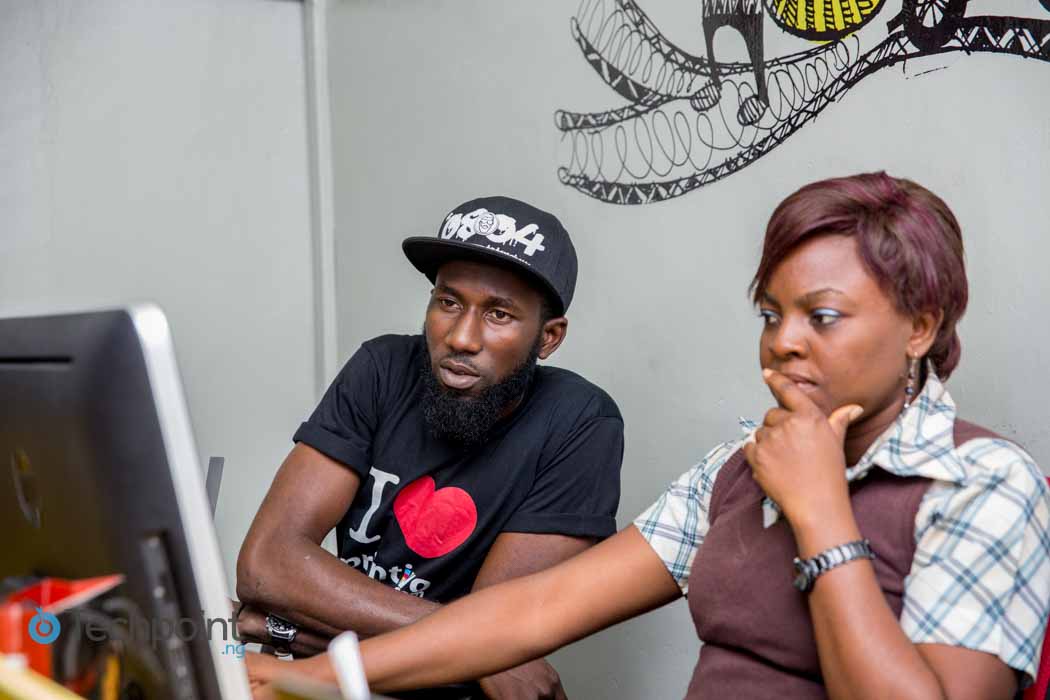
That was our first goal. Within the third month we were already making enough to keep the business going. Every other extra funding that was coming inside, we kept pumping it into exapnsion. Which is why within a year we were able to expand our category, we were able to fund constant technology development, building the team and everything else to keep the business running.
So I would say there are funds, but there may not be enough fundable businesses. What is common in this part of the world is that the idea might be great but the team is not too good.
How is Printivo able to cater to SMEs, who make small orders at a time, and still keep the business profitable?
For us, one of the most important parts of our business is Print Production. A larger percent of our revenue comes from that. We have 3 customer segments – the small scale businesses who come to the website to place their orders, the graphic designers, who order on behalf of their clients and corporations and multinationals.
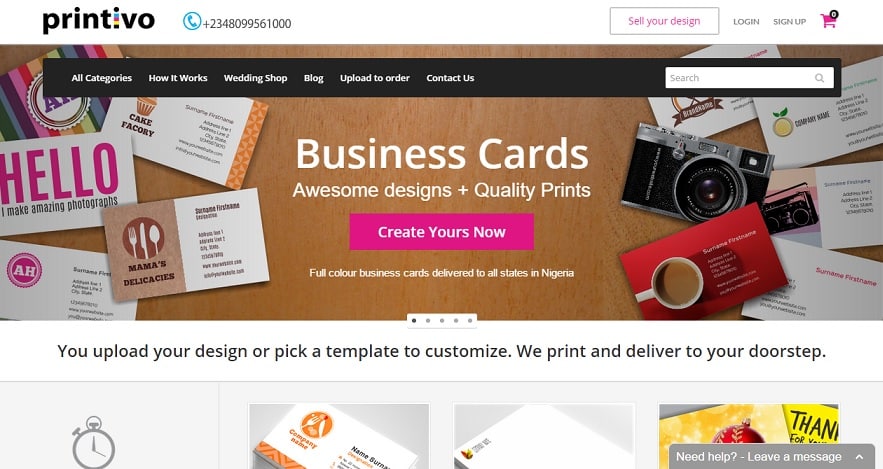
We print at nearly the cheapest prices and SMEs still order in small scale. At first when we started Printivo, we saw ourselves as a tech enabled business. But as we continued in the business, we suddenly realised that there was a hardly a week that we weren’t iterating development projects on the side. At a point we realised that we are not just a tech enabled business, we are actually a tech business.
We noticed your are strategically situated in the outskirts of Shomolu, Nigeria’s printing capital
Do you see Printivo as competing against the brick and mortar Printing Presses of Shomolu?
The bigger vision for Printivo is not to compete. If you look at the printing industry globally, people say it is declining. That’s not true. You first need to understand that there is a huge difference between print production and print media. Print media refers to newspapers and the like. Print production refers to production of marketing material. The Print Production market is growing at 20% globally every year. New technologies are being brought in to make things easier and a lot more seamless.
Now for a market like Nigeria, we have barely scratched the surface. This is a market that cannot even meet its demand. The moment Nigeria hits ’ember months, every printing press is in chaos. We should ask, why can’t Nigerian printers meet deadlines? We all grew up to know that printers are very big disappointments. We’ve had instances where what you ordered would be delivered to you at the venue of your wedding. Or even as you are rounding up the event. Why is it like that? It’s because the industry has more demand than supply.
So we don’t see ourselves as competing with anybody. We see ourselves as giving our customers better options to what they’re used to. Nigerian customers are used to sitting at the printing press. They’re used to using their phones to chase the printer about. They’re used to waiting for weeks before they get their orders. They’re used to printers picking one order from them and waiting to get 10 other orders before they produce. We are changing that. We have changed that.
Now you can sit in your house in Abuja, place order on Printivo and have it shipped to you within days. Now the graphic designer who usually would have to leave her system and go to the print shop can easily order on Printivo and ship to the customer’s address directly, giving her time to focus on her core business which is designing.
We don’t see ourselves as competing with printers who can’t even meet their demand. We see ourselves creating a new option for customers to order.
We noticed Printivo doesn’t offer Pay on Delivery. Why is that?
We are a mass customization company. If we have tens of thousands of orders, each order is unique. We cannot afford to play with returns in our segment. If an order is returned, it is a lose-lose for us. We’ve lost on the cost of logistics of shipping to that customer. We’ve lost on the cost of actually getting that order ready for production.
Nobody wants to really talk about the pain of supporting Pay on Delivery but the reality is that it is a serious pain for everybody in the eCommerce business in Nigeria. The return rate is something else but nobody wants to talk about it. We cannot afford that.
However we are building trust with our customers such that if we deliver to you and in any case you don’t like your delivery, you can be 100% sure that we will reprint. We are here to make our customers happy. As long as the product has been paid for, we can go any length to satisfy our customers.
We also have money back guarantee. So if you are not satisfied with your order and we are unable to fix it, we will refund your money. That is better than offering Pay on Delivery.
What kind of customers do you see using your web platform? My impression is that maority of your target audience are not internet-savvy.
Apart from being online, we have a call-to-order option were you can instruct the team on how to create your order.
We also have account executives who handle big organizations that order in bulk. Our B2B customers whose specifications are too unique to be ordered with standard templates on the website. To put it better, we are an hybrid of online and offline. However a larger part of our orders are online. Also we realise that we are growing a market. We are reaching customers with something they are not used to. So we have to be ready to bend their way. We have customers who are not very tech savvy who find our site and prefer to call. We have a team than converts such customers.
What is your biggest motivation?
Our biggest motivation is watching customers grow. It is really amazing working with SMEs. You actually get to see first-hand the real core of the economy. Things that you never knew could be monetized, you see customers in that segment ordering marketing materials. And within months, this person that started with just a pack of 100 business cards for herself, will order for an increasing number of employees. Soon she is ordering for materials to open her official office. We are seeing our customers grow. You see the real effect of SMEs at work. It is something we see every now and then. It is part of the things that motivates us.
What advice would you give budding entrepreneurs in the system?
Like I said earlier I am new in tech. I came only 2 years ago. But I have always been around tech. There is something that I have noticed that really needs to change.
I see people seeking funding first before starting up. Just start. From day one of your business, think of how you are going to get revenue.
The best person that can keep your business afloat is your customer. Nigerian startups focus too much on investors money. Then months after the Startup is dead. Why? Because there are no customers to pay. If you focused on customers from day one, one thing will happen. You will stay in business till investors eventually come. And when they come, they will find paying customers, which is what investors are looking for.
In short, focus on customers money from day one. Not just that, deliver results and value. If you do that, you will stay in business, no matter how bad things get, till when investors eventually come so you can expand. But if you focus on investors money from day one, you may not get customers. You may not even get investors and if you’re not careful, you will be out of business.



